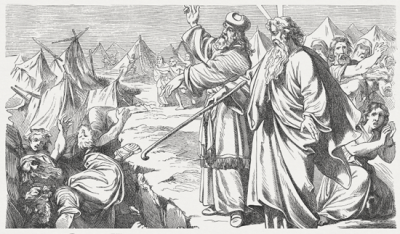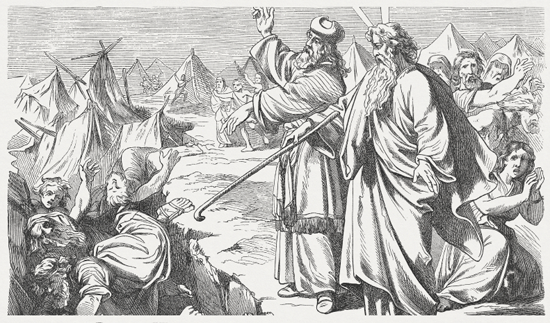
Eric Fingerhut, you take too much upon yourself.
The CEO of Hillel International could not resist taking a swipe at the ever-growing Open Hillel movement in his speech to the Hillel General Assembly, comparing us to Korach and his band of rebels. Korach, and by implication, Open Hillel, initiated a dispute that was not for the sake of Heaven (cf. Pirkei Avot 5:17), and therefore did not endure. While Fingerhut’s repeated assertion that “Hillel is an open, pluralistic organization,” which has yet to be backed up by evidence or action, is unlikely to convince anyone who does not already agree with him, I want to linger on the metaphor he selects and interject a few words on Korach’s behalf.
Let’s acknowledge three major problems with this allusion. First, Fingerhut suggests that “Hillel has a special role in setting boundaries around appropriate arguments.” This strikes me as utterly preposterous, especially when we consider its application to Parshat Korach. If Hillel is the boundary-setter in this metaphor, to what shall we liken it? Is Hillel like Moses, who engages in a dispute with the rebellious group? Is Hillel like the sages, who determine after the fact that Korach’s motives were impure? Or is Hillel, dare I say it, like God, who exacts violent judgment against the faction? All of these options imply that Hillel has a right to set boundaries with respect to normative Judaism, a ridiculous self-perception on the part of Hillel International. They are not Moses, nor a sage, nor, it goes without saying, God, and it is not for them to determine what arguments are and are not “Jewish.” Second, Fingerhut implies that Open Hillel has “deceived” the Jewish community by misrepresenting our motives. As I have written elsewhere, members of Open Hillel hold various opinions on the State of Israel, but we are united in our ahavat Yisrael, our love for the Jewish people. While suggesting that we’re all secretly anti-Zionist agitators who work against the interests of Jewish students might make for a good applause line, it simply has no basis in reality. Finally, it is ironic that Fingerhut suggests that one lesson of Parshat Korach is “unwillingness to engage in dialogue…is wrong.” Open Hillel would like nothing more than to engage in genuine dialogue; that’s why we invited Fingerhut, along with plenty of Jewish leaders to his right, to our conference in October. One can only gawk at the chutzpah Fingerhut displays in refusing our invitation, and then accusing us of an insincere commitment to dialogue!
Despite all of this, I actually think Korach’s rebellion is precisely the lens through which we should understand Open Hillel. Consider what Korach actually says: “The entire congregation are all holy, and the Lord is in their midst. So why do you raise yourselves above the Lord’s assembly?” Note that Korach does not condemn the idea of Jewish leadership, but merely charges that Moses has gone too far in his exercise of power. The holiness of am Yisrael, Korach suggests, comes from our covenant with God, not from the authority of our leaders.
This is, I would suggest, an early iteration of a debate that Jews know quite well: a disputation over the question, “what does it mean to be a member of the Jewish people?” Insofar as this debate is essential to the vitality of the Jewish future, how could it possibly be for the sake of anything but Heaven? How could we possibly allow it to not endure? Tradition has recast Korach as a prideful agitator, but I suggest we remember him as a daring reformer, who believed in the holiness of the Jewish people so passionately that he exposed himself that most hurtful accusation-that he was a disloyal, or self-hating Jew-to fight for a vibrant Jewish future. We must remember that Korach loved God.
Some may think this reading absurd, and indeed, the peshat meaning of the text suggests we should simply dismiss Korach as a subversive who had to go. I cannot do that, for the simple reason that we know Korach’s name. We would not know his name unless some point had to be made. Some point only had to be made if some question was being asked. Some question would have been asked only if some uncertainty existed as to how authority ought to work in the Jewish community. Reading Parshat Korach as a response to that question, we see that the text is not neutral, but actually quite slanted. This text has an agenda: to stigmatize Korach’s rebellion, and erase him from our collective consciousness. Every time Parshat Korach is read in the synagogue, Korach’s erasure is repeated.
The only way to reverse this erasure is through a subversive act of memory. Above all, we must remember that Korach was Jewish. Remembering Korach as Jewish destabilizes the implicit connection that Hillel’s Standards draw between Judaism and Israel, because it forces us to recognize that our Jewish identity has nothing to do with our adherence to communal orthodoxy (small o), and everything to do with our holiness as a covenantal people. Parshat Korach contains what the Catholic theologian Johann Baptist Metz calls a “dangerous memory,” because it reveals a way of being Jewish that resists the hegemonic mainstream’s attempts to assert itself over and against the alternatives of dissidents. Powerful people don’t like dangerous memories. Dangerous memories force powerful people to justify their power, to explain why their Judaism is the Judaism. It’s much easier to relegate Korach to the realm of forgotten rebels than to remember him as a prophet of a suppressed possibility.
Like Korach, Open Hillel is dangerous. We’re dangerous to the right-wing interests that think they can buy the ability to represent Jewish students. We’re especially dangerous to those who can’t tolerate a Judaism that refuses redlines, and who arrogate for themselves a “special role in setting boundaries.” And, God willing, we’re getting more dangerous every day. That’s the only reason Fingerhut had to mention us in the first place: we’re winning. Maybe Hillel International is praying that a big hole in the ground is about to swallow us up, but until it does, we’ll continue to be very clear about our goal: a Jewish community that accepts and reflects the holiness of our entire people.
Evan Goldstein is a student at Boston College.

